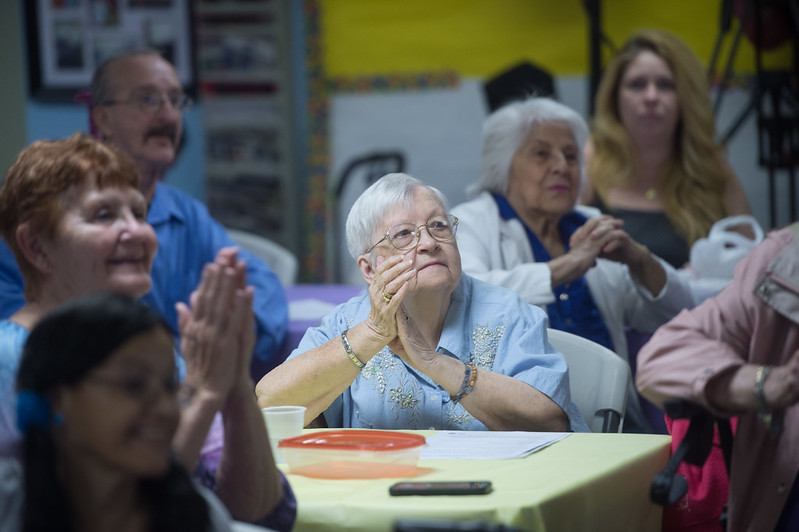
Older New Yorkers at a senior center (photo: Michael Appleton/Mayoral Photography Office)
I’ve spent my entire professional life helping New Yorkers age with dignity. Never have I seen a challenge more pressing than our current need to keep older adults connected to the technologies and tools that drive almost every aspect of our lives.
The pandemic brought to light the challenges and new obstacles faced by older adults who were left behind without access to technology and the critical skills needed in an increasingly digital world, particularly in the workforce. Whether adults are trying to stay longer in the workforce that requires technology, navigating telehealth to connect to health services, or just keeping in touch with friends and family through the extended pandemic health crisis – COVID-19 has made it clear that being able to stay connected with technology is critical.
According to Hunter College’s Brookdale Center for the Aging, one-quarter of New Yorkers ages 60-79 do not have internet access at home and in total, nearly half-a-million older adults are disconnected from the internet. Even for older adults who have access to technology devices, three-quarters of those older than 65 said they needed someone else to set up their electronics, per a 2017 Pew Research study.
Meaningful access to technology for older adults is often made possible by community-based organizations that are working to close the older adult digital divide and support our growingly diverse aging population in New York City. Throughout the pandemic, community-based organizations were the lifeline for many older adults, providing critical support to keep them connected in their community, from virtual programming to combat social isolation to training and education programs to expand older peoples' access to technology. However, more must be done by the city to close the older adult digital divide and we have no time to waste.
In particular, the digital divide has only exacerbated the work prospects for many older adults. Older people encounter many challenges with technology in the workplace and commonly experience discrimination that is rooted in ageism — the discrimination based on negative assumptions on age — that hinders older people’s ability to enter or stay in the workforce. According to a recent AARP survey, 77% of older workers say they have seen or experienced age discrimination in the workplace.
Nonetheless, with research and evidence filling our sails and the opportunity to reimagine services for older New Yorkers, Greenwich House set out to establish a new intergenerational work and skills development center to address the digital divide within the workforce for older adults. At our newly created Workforce Center, we’ll help fill the digital gap and connect older adults to the technology they need to continue to adapt to and thrive in the changing work world.
The Workforce Center will incorporate services that build older adults’ enterprise workforce skills, including their digital literacy and specific technology skills, as well as provide counseling and direct connections to work, and access to local and citywide service opportunities. We also hope to identify the needs of each older adult who visits, and offer resources to develop the skills needed to meet this digital divide even if that means finding access to free wifi and devices for the older adult to use at home.
Every New Yorker should have meaningful access to technology.
While there is still more work to be done across the city, we hope the Workforce Center will move the city forward in the right direction by increasing awareness of the older adult digital divide and providing support for older adults by developing the knowledge and skills that would enable them to get back into — or stay in — the workforce.
***
Laura Marceca is Associate Director of Older Adult Services at Greenwich House.
***
Have an op-ed idea or submission for Gotham Gazette? Email This email address is being protected from spambots. You need JavaScript enabled to view it.




